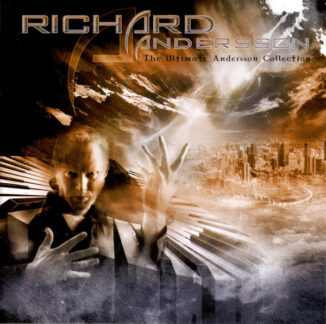
The second chapter to Richard Andersson’s Space Odyssey is here: The Astral Episode offers a new line up, but it’s still the work of keyboard player Richard Andersson himself, who has composed, arranged, and produced all the music, just like before. Also, like before, his friend Magnus Nilsson joins in on guitars and, this time, handles the bass. Completing the line up is Andreas Brobjer on drums, and Nils Patrik Johansson on vocals; both new to the project.
The Astral Episode is an album in the Neo-Classical stream, with some ass-kicking Speed Metal parts. “Through Dreams and Reality” kicks off the show in just the manner an album like this should begin: fast, intense, and loud. It serves up a machine gun instrumental bridge, a solid guitar solo, and one insane ending as far as drums are concerned.
Next one out, “Astral Episode,” follows up nicely with its mystical intro, syncopated rhythms, and Symphonic arrangement. Unfortunately, the melody doesn’t quite level the arrangement and the song is utterly ruined by a stupendous fade out. On the other hand, there is a mighty cool ping-pong sort of battle between the guitar and keyboards before the solos, and that’s a life saver in this case.
The album has a couple of tracks, “Lord of the Winds” and “Back to the Dark,” with a softer wrapping, but they’re not exactly ballads. Both of these songs have far less to offer than their more up-tempo and harder counterparts. What is odd is that both these songs have an aura of Ayreon about them. Whether or not these were done from a tribute point of view is hard to judge. Anyway, it only adds to the impression that these songs are less than average … and to spoil the party entirely is the fade out in “Lord of the Winds.”
What’s the big deal with fade outs? Fade out is, when done correctly, a natural way of ending a composition, even if it’s something that has emerged from the use of modern recording technology, rather than from a truly musical perspective. When done in a fashion like on this album, the fade out leaves the composition in some kind of an unfinished state: “We don’t know how to get this over with, we are stuck in a chord pattern we can’t get out of, so we’ll just tuck it nicely in under the carpet and pray nobody finds it.” Well, it was found, and it’s not pretty.
“Dazzle the Devil,” which is in-between the two softer songs, also has a softer side in its soaring guitar solo at the end. Still, this one has far more appeal with a catchy groove and a solid punch in the freaky part before the final solo. There is a drop here, too, since the chorus after the solos is in a lower key, where singer Johansson doesn’t know on which leg to stand. This punctures some of the song’s impact.
The big savior in The Astral Episode is the instrumental “Presence of Mind.” It’s a killer composition and a definite highlight with its elegant and baroque phrasing. This is the composition where Richard Andersson’s tone gets the attention and focus and space it deserves! He plays with a tone, which is a harpsichord attack underneath a creamy, rich, and nicely rounded lead sound. The “chorus” of the song is nothing but breathtaking in its pure simplicity! Also, Nilsson’s guitar rings out naturally and emotionally in his solo towards the end of this song. The prize, though, goes to drummer Brobjer in a no-words-can-describe syncopated race with Nilsson whipping the bass as if it was a berimbau (Brazillian one-string instrument played with a tiny wooden stick). Bravo!
Rounding out the show are “Reversation” and “The Seventh Star Fantasy.” “Reversation,” with a majestic opening, an inspiring guitar/keyboard duet, and a German Metal style arrangement is the better among the two. Also, Johansson opens this song with a more natural/clean voice, as opposed to the attempted soulful grunting style that paints the rest of the album. Needless to say, he peaks with this song.
“The Seventh Star Fantasy” also has some distinct qualities. Not only does it feature Johansson in a clean/dirty duet with himself, it has a demonic choir intro and a very theatrical layout as well, making it the most epic track on The Astral Episode. There is a hint of King Crimson along the way, without any negative influence on the outcome. However, the very Ayreon-style chord progression and guitar solo, along with a surprisingly awkward transition from the solo back to the chorus, and a peculiar, abrupt ending spoils this one’s chances of spontaneous applause and calls for da capo.
With this album, Andersson once again proves his abilities as a keyboard player, as well as a skilled composer and arranger. The other musicians also prove their skills, although singer Johansson’s soulful, raw voice seems a little less convincing, leaving a kind of artificial impression. His clean voice is much more appealing!
Special regards goes to guitarist Nilsson for some mighty fine soloing on this album, and for knowing not to shred a perfectly good solo line into pieces and patterns. Instead, he takes his own sweet time and gives the good phrases a chance to ring out and to settle in. Respectful and musical.
At the end of the day, The Astral Episode is an album with potential and it’s likely to be well-received due to the fact that it is quite enjoyable. In spite of a handful dents and bruises, there are some good moments and that’s why thumbs are up for Richard Andersson’s Space Odyssey.


Be the first to comment